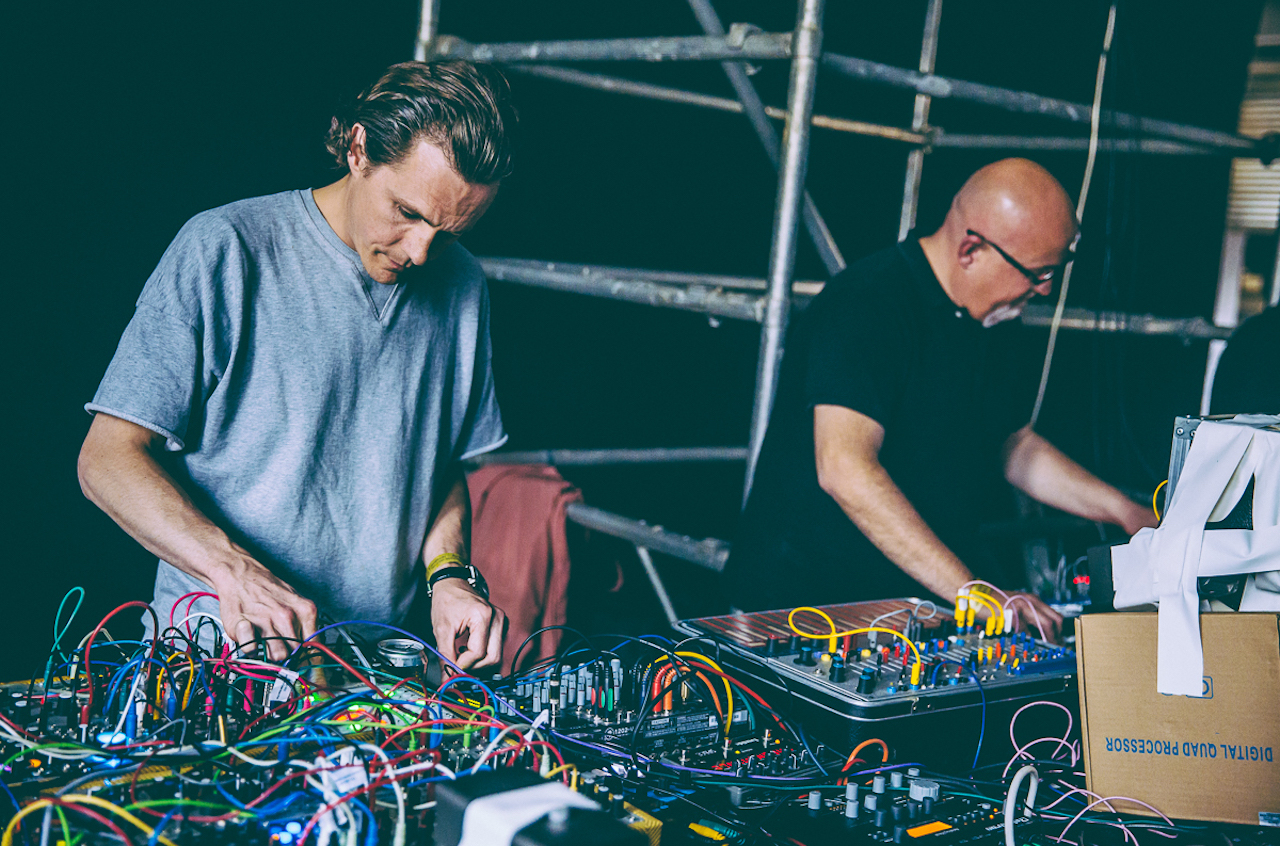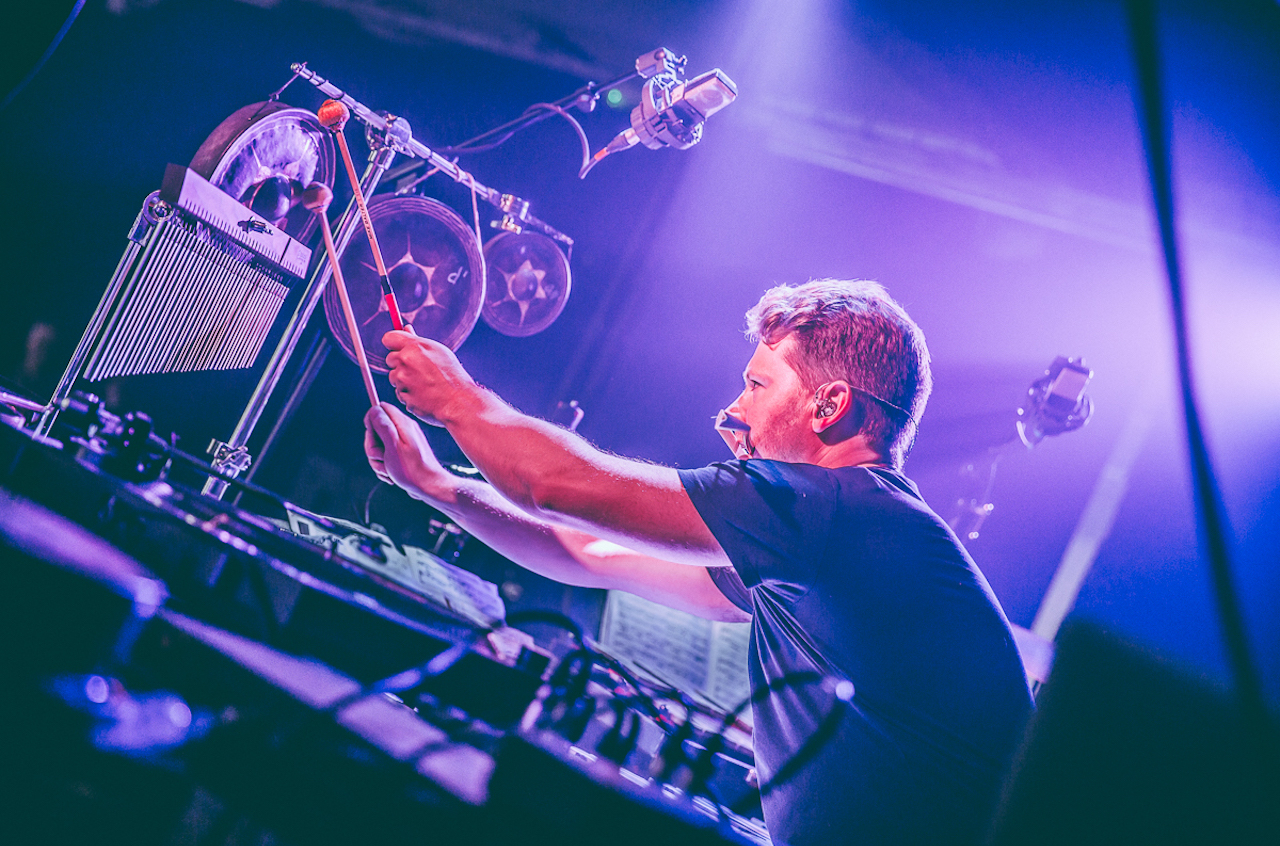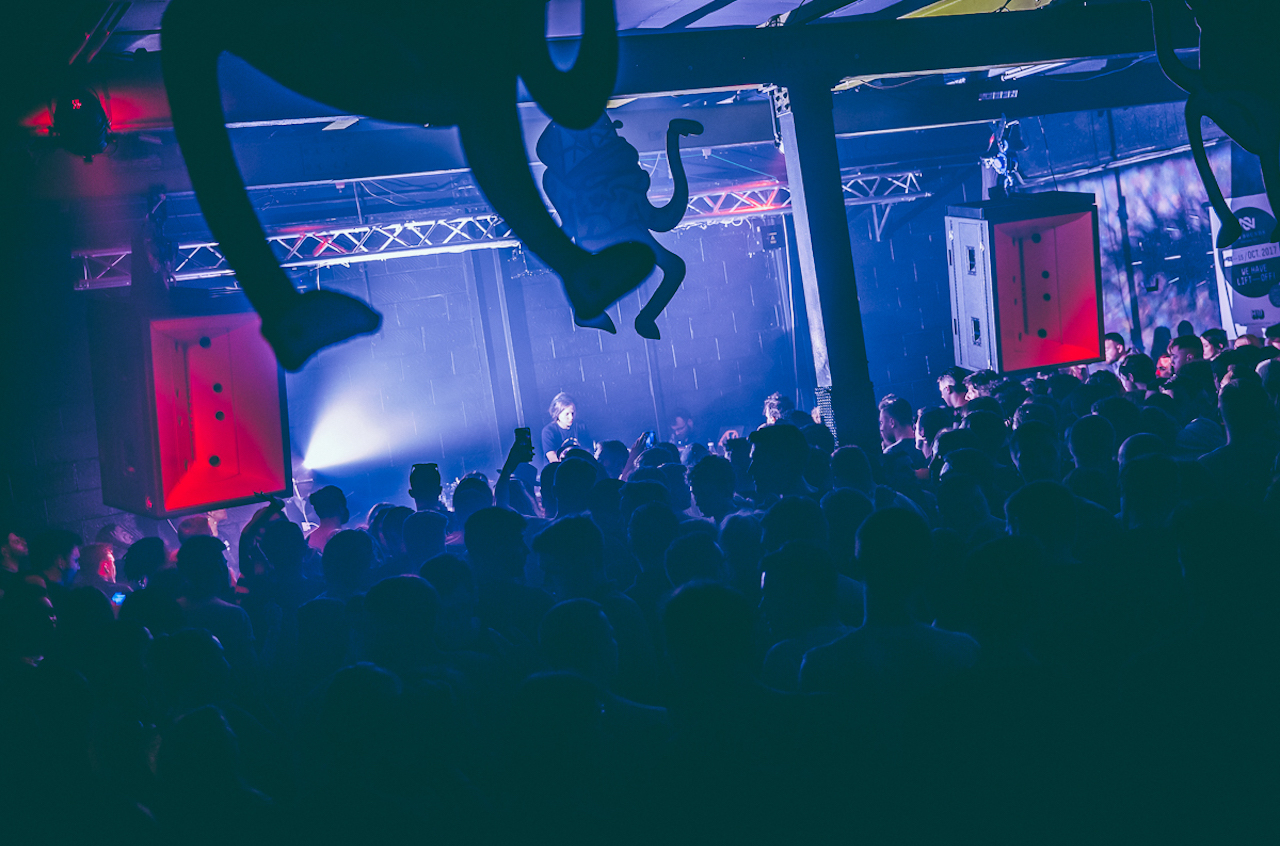- Surrounded by a jumble of patch cables on the second floor of Sheffield's Trafalgar Warehouse, Phil Ventre, of London Modular Alliance, had something on his mind. "Electro has never been cool," he said with a smile. "It's always had a core following and they're very loyal but quite purist." Ventre, who's one third of the trio alongside Gavin Pykerman and Simon Lynch, forgave me for suggesting that his group are purists. "There's more to it than that," he said.
Ventre and Pykerman confirmed as much later that evening during their live performance on the building's ground floor. (Lynch was absent.) Crowds swarmed around the duo. Their improvised approach references UK techno as much as it does Detroit electro. Menacing 606 hats hissed harshly overhead, but they didn't feel confined to just one drum machine. Additional 808s and 909s furnished their fractured rhythms. Considering the gear they have at their disposal, the level of restraint shown was impressive.
Split into separate day and night sections—with the late-night lineup scheduled across town at Hope Works—things were just warming up at the launch party for new Sheffield festival No Bounds. The 18-hour marathon was the dress rehearsal for the main event in October. The extensive daytime programme was spread across three floors of Trafalgar Warehouse. The building was a maze of art and sound installations, but during the odd moment alone it still felt like you were trespassing in an abandoned building.
At around 3:30 PM on Friday, through the walkway on the first floor, three women sat patiently at laptops. Synth noise blasted intermittently from scattered speakers, while a chatroom was projected onto the wall. As the minutes went by, it became clear that the group—Orchestra For Females And Laptops, or OFFAL—were gathering women from the global online community to create an improvised modular symphony. This was an inventive response to the lack of women making computer music worldwide and a focussed attempt to break down hierarchies.
Later, in the main room, half-light flooded through the dusty, cracked glass of the stairwell. Either side of Kaitlyn Aurelia Smith sat a muscular soundsystem that looked like it had been lifted from a spacecraft control desk. Her sci-fi sound suited the setup, the centrepiece of which were several foghorn-like VOID Air Motion speakers. Her voice, a chorus of synthesised octaves, hit a sweet spot between uplifting and melancholic. She demonstrated her abilities as a songwriter, which provided a refreshing contrast to the otherwise techno-heavy lineup.
As things began wrapping up at Trafalgar Warehouse, partygoers clambered onto various shuttle buses and were dropped off at Hope Works. A queue snaked outside the venue. The neighbouring factories were all firmly shut and the surrounding streets deserted. In the middle of the main room, bodies slowly multiplied as Lena Willikens supplied mid-tempo machine rhythms, locking newcomers in a trance. Above them, metal beams dissected the high ceilings, while deformed cartoon figures, spray-painted on, stared down vacantly.
DJ Nobu's entrance marked a distinct shift in pace. The Japanese artist—seen
outside moments before, escaping a punter vomiting nearby—all but stripped the paint off the walls with his hyper-functional techno. This period of intense linearity gave Nina Kraviz, who was sandwiched between Nobu and Helena Hauff, no choice but to draw for the big-room weapons. She took command with consistently thumping tracks. The four-on-the-floor pulse remained, though her selections felt more dynamic.
Hope Works' second room, a strangely intimate triangular space that resembled a converted garage, was a welcome break from the main room. With a capacity of about 50, there was none of the overbearing heat and packed bodies. Courtesy was excellent in there, reaching for rich house and distilled strains of techno. Anyone who entered was quickly drawn in and stayed firmly put.
On this evidence, Sheffield's ravers have good staying power. It was only at 5 AM that people began filtering out. Those who wanted to end the night in style stayed for Helena Hauff, who closed the main room with a masterclass in how to do it without overdoing it. Her set ran the gamut from hardened '90s US techno to more industrial European tracks. At one point, she dropped Joey Beltram's "Mentasm," an undisputed rave classic that was so loud you probably could have heard it from several streets away.
Photo credit /
Alex Morgan
 As things began wrapping up at Trafalgar Warehouse, partygoers clambered onto various shuttle buses and were dropped off at Hope Works. A queue snaked outside the venue. The neighbouring factories were all firmly shut and the surrounding streets deserted. In the middle of the main room, bodies slowly multiplied as Lena Willikens supplied mid-tempo machine rhythms, locking newcomers in a trance. Above them, metal beams dissected the high ceilings, while deformed cartoon figures, spray-painted on, stared down vacantly. DJ Nobu's entrance marked a distinct shift in pace. The Japanese artist—seen outside moments before, escaping a punter vomiting nearby—all but stripped the paint off the walls with his hyper-functional techno. This period of intense linearity gave Nina Kraviz, who was sandwiched between Nobu and Helena Hauff, no choice but to draw for the big-room weapons. She took command with consistently thumping tracks. The four-on-the-floor pulse remained, though her selections felt more dynamic.
As things began wrapping up at Trafalgar Warehouse, partygoers clambered onto various shuttle buses and were dropped off at Hope Works. A queue snaked outside the venue. The neighbouring factories were all firmly shut and the surrounding streets deserted. In the middle of the main room, bodies slowly multiplied as Lena Willikens supplied mid-tempo machine rhythms, locking newcomers in a trance. Above them, metal beams dissected the high ceilings, while deformed cartoon figures, spray-painted on, stared down vacantly. DJ Nobu's entrance marked a distinct shift in pace. The Japanese artist—seen outside moments before, escaping a punter vomiting nearby—all but stripped the paint off the walls with his hyper-functional techno. This period of intense linearity gave Nina Kraviz, who was sandwiched between Nobu and Helena Hauff, no choice but to draw for the big-room weapons. She took command with consistently thumping tracks. The four-on-the-floor pulse remained, though her selections felt more dynamic. Hope Works' second room, a strangely intimate triangular space that resembled a converted garage, was a welcome break from the main room. With a capacity of about 50, there was none of the overbearing heat and packed bodies. Courtesy was excellent in there, reaching for rich house and distilled strains of techno. Anyone who entered was quickly drawn in and stayed firmly put. On this evidence, Sheffield's ravers have good staying power. It was only at 5 AM that people began filtering out. Those who wanted to end the night in style stayed for Helena Hauff, who closed the main room with a masterclass in how to do it without overdoing it. Her set ran the gamut from hardened '90s US techno to more industrial European tracks. At one point, she dropped Joey Beltram's "Mentasm," an undisputed rave classic that was so loud you probably could have heard it from several streets away. Photo credit / Alex Morgan
Hope Works' second room, a strangely intimate triangular space that resembled a converted garage, was a welcome break from the main room. With a capacity of about 50, there was none of the overbearing heat and packed bodies. Courtesy was excellent in there, reaching for rich house and distilled strains of techno. Anyone who entered was quickly drawn in and stayed firmly put. On this evidence, Sheffield's ravers have good staying power. It was only at 5 AM that people began filtering out. Those who wanted to end the night in style stayed for Helena Hauff, who closed the main room with a masterclass in how to do it without overdoing it. Her set ran the gamut from hardened '90s US techno to more industrial European tracks. At one point, she dropped Joey Beltram's "Mentasm," an undisputed rave classic that was so loud you probably could have heard it from several streets away. Photo credit / Alex Morgan